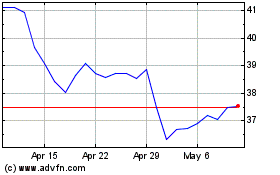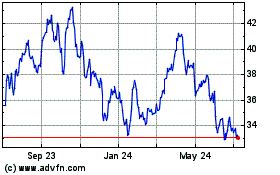By Brent Kendall and Alison Sider
WASHINGTON -- The Justice Department on Wednesday filed an
antitrust lawsuit challenging Halliburton Co.'s planned acquisition
of rival Baker Hughes Inc., alleging that the deal would threaten
higher prices and reduce innovation in the oil-field services
industry.
The lawsuit, filed in a Delaware federal court, asserts that the
transaction would eliminate important head-to-head competition in
markets for 23 products and services used for U.S. oil exploration
and production, from drill bits to offshore cementing services. The
effect would be to skew energy markets and harm American consumers,
the department said.
Bill Baer, the Justice Department's antitrust chief, pulled no
punches in his criticisms of the merger and made clear the
government's decision to sue wasn't a close call.
"I have seen a lot of problematic mergers in my time. But I have
never seen one that poses so many antitrust problems in so many
markets," Mr. Baer said. Some deal proposals should never leave the
corporate boardroom, he said, and "this deal falls squarely in that
category."
The companies pledged to fight the Justice Department lawsuit.
In a joint statement, they said they "believe that the DOJ has
reached the wrong conclusion in its assessment of the transaction
and that its action is counterproductive, especially in the context
of the challenges the U.S. and global energy industry are currently
experiencing."
The Wall Street Journal reported Tuesday that a government
lawsuit challenging the transaction was imminent.
The nearly $35 billion deal, originally announced in November
2014, proposed to combine the world's second- and third-largest
oil-field services firms, behind only Schlumberger Ltd.
The transaction has faced antitrust resistance around the globe,
including in Europe. The U.S. lawsuit Wednesday is the biggest
hurdle yet for the merger.
Since the deal was struck, the oil-field services industry has
faced severe setbacks, as persistently low oil prices have slashed
demand for the business of drilling wells and pumping oil and
natural gas.
Mr. Baer said the government was "certainly aware" of what has
happened to oil prices. But he said the companies operate in a
cyclical business and the downturn "is not a justification for an
anticompetitive merger."
Halliburton and Baker Hughes have been trying to ease concerns
that their merger would slash competition by offering to sell off
assets worth billions of dollars to other firms, an action called
divestiture.
The companies said Wednesday their proposal would "facilitate
the entry of new competition in markets in which products and
services are being divested." Halliburton said it strongly believed
"that the proposed divestiture package, which was significantly
enhanced in response to concerns that the DOJ expressed during the
course of its 15-month investigation, is more than sufficient to
address the DOJ's specific competitive concerns."
The companies said their combination would create a more
flexible, innovative and efficient company that could reduce costs
for customers.
Baker Hughes Chief Executive Martin Craighead told employees in
a letter the company believed it had a strong case. Mr. Craighead
said he couldn't predict how long the litigation would take.
The companies previously set a deadline of April 30 for
obtaining all the regulatory approvals for the merger agreement,
after which either company could terminate the deal, though they
could also choose to stay the course.
The Justice Department was highly critical of the companies'
divestiture proposal, saying the merged firm would retain more
valuable assets while selling less-significant ones to third
parties.
The department's Mr. Baer said the government had held off on
filing a lawsuit to give a full hearing to the companies' offer.
But he said Halliburton's proposal for fixing the transaction's
competitive problems "changes by the day" and is "so complicated
and convoluted" that it could never work to preserve a competitive
marketplace.
Baker Hughes stands to collect a steep $3.5 billion breakup fee
from Halliburton if the deal doesn't pass antitrust muster. But
some analysts said Baker Hughes might struggle to regain its
footing as an independent company if the deal falls through.
"We believe the biggest risk with a suddenly stand-alone BHI is
the state of the company's operational capabilities after a wave of
departures and, according to multiple industry sources, the
apparent unorganized and disengaged nature of the rest of the
organization," Wells Fargo analysts wrote.
But, they noted, the company would have as much as $5 billion on
its balance sheet and a lot more freedom to cut costs and improve
margins than it has had in the past year. Baker Hughes shares shot
up almost 9% to $42.83 Wednesday. Halliburton shares rose almost 6%
to $36.44.
In addition to the breakup fee it would owe Baker Hughes,
Halliburton would be on the hook to redeem $2.5 billion worth of
bonds if the merger isn't consummated by November. Still, analysts
said the company could likely handle the cash outflow.
"With Halliburton, the balance sheet becomes a little less
flexible, but it doesn't fundamentally redefine the company," said
Bill Herbert, an analyst at Simmons & Co., a division of Piper
Jaffray Cos.
While most mergers continue to receive government approval, the
legal challenge is the latest evidence that U.S. antitrust
enforcers in the Obama administration are pushing back against
transactions they believe raise significant threats to
competition.
Last year, the Justice Department challenged several major
deals, including General Electric Co.'s planned sale of its
appliance business to Electrolux AB and Comcast Corp.'s planned
acquisition of Time Warner Cable Inc.
Both of those deals were eventually abandoned.
The Federal Trade Commission, meanwhile, is in the midst of
court proceedings against a proposed merger of Staples Inc. and
Office Depot Inc.
Write to Brent Kendall at brent.kendall@wsj.com and Alison Sider
at alison.sider@wsj.com
(END) Dow Jones Newswires
April 07, 2016 02:16 ET (06:16 GMT)
Copyright (c) 2016 Dow Jones & Company, Inc.
Halliburton (NYSE:HAL)
Historical Stock Chart
From Mar 2024 to Apr 2024

Halliburton (NYSE:HAL)
Historical Stock Chart
From Apr 2023 to Apr 2024
